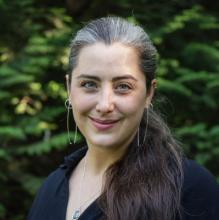Erika Dort
Why did you decide to pursue a graduate degree?
I have a deep-seated passion for science that has continued to grow throughout my life. While my BSc and MSc degrees gave me many of the research skills I need to become a scientist, a doctoral degree will allow me to pursue a career as an independent researcher and answer the biological questions I find most interesting. I will also be able to mentor and teach young scientists, a pursuit for which I am also very passionate.
Why did you decide to study at UBC?
After exploring a few doctoral programs at various institutions, I was ultimately connected with Dr. Richard Hamelin, a forest pathologist and geneticist, whose research program really resonated with me and aligned with my research interests. After reading more about the University of British Columbia and the Faculty of Forestry, I was convinced that it was the best place for me to pursue my PhD degree.
What is it specifically, that your program offers, that attracted you?
The research taking place at the Faculty of Forestry is diverse, innovative, and multidisciplinary. It is an incredible opportunity to work in Dr. Hamelin's lab with cutting edge technology and pursue research that will improve our ability to manage and mitigate destructive forest diseases in the future.
What was the best surprise about UBC or life in Vancouver?
While at first the chaos of Vancouver can be a bit overwhelming, I soon discovered that there are numerous places to find quiet and solitude and connect with nature even within the city. Pacific Spirit Park is a particular favourite of mine, with a seemingly never-ending network of trails to explore. The UBC Vancouver campus is also stunning and a wonderful place to explore when you need a break from academic life.
What aspect of your graduate program do you enjoy the most or are looking forward to with the greatest curiosity?
I am currently troubleshooting some very difficult and complex lab experiments, but I am so looking forward to getting them working, seeing the results, and exploring the biological implications.
What aspects of your life or career before now have best prepared you for your UBC graduate program?
The road that led to my pursuit of a PhD was a somewhat long and winding one – I have held a diverse array of positions, both academic and non-academic, and it was experiencing this diversity that allowed me to have absolute confidence in my decision to enter a doctoral program and to acquire the skills and resilience to make it through my degree.
What do you like to do for fun or relaxation?
I play squash, go for long walks in the city, hike, and read.
What advice do you have for new graduate students?
Establish interests and pursuits outside of your thesis and research group. While your research is obviously the most important task at hand, it is really important to bring balance into your life – it will actually make you more productive. Reach out for help when you need it – it really does take a village to complete a graduate degree, and we are all in this together.

